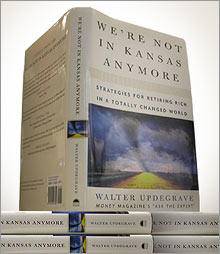|
|

|
|
More information on Updegrave's new book.
|
|
|
|
|
|
|
NEW YORK (CNN/Money) -
My husband and I are trying to decide whether to stay in our current home or move to a bigger one. I think we could make do with our present house (although things are getting a bit crowded with three kids).
But we also think that by moving to progressively bigger and better homes and selling along the way we could pile up some nice profits for retirement. In fact, a real estate agent told me that moving from home to home over the years was the best financial move he ever made. What do you think we should do?
-- Wendy, Hartford, South Dakota
I remember as a boy seeing a sign in the window of the barber's shop in my little neighborhood in Philly that said "You should visit your barber every two weeks."
Even as a kid I wondered whether anyone could take that advice seriously. I mean, the guy's a barber. Of course, he thinks you should get your hair cut every two weeks.
Real estate can be a good investment
I put your real estate agent's advice in the same category. He makes his living selling houses, for goodness sake. So naturally he's going to see serial buying and selling of real estate as a wonderful strategy for building wealth (especially his own, since he'll be collecting that fat 6 percent commission every time you sell).
And, of course, the case for a house being a wonderful investment is easy to make these days. Houses do have a record of solid appreciation over long periods, typically outpacing inflation by about a percentage point or so a year.
Over the past five years, residential real estate has done even better, with home prices rising more than 50 percent nationally and even doubling in some areas. For a look at the current state of the housing market, including hot and cold markets, click here.
But primarily it should be a nice place to live
But despite the current mania for making money on the house, I still contend that the primary rationale for deciding to buy a home is whether you think it would be a nice place to live and raise your family, not whether it's the best place to accumulate wealth for retirement.
That's not to say that I think you should ignore the investment aspects of a home. You certainly want to factor resale value into your buying decision by considering whether the house is in an attractive and safe neighborhood, in decent school district and close to amenities such as shopping and recreation. [For more on what you should consider when buying a home, click here.)
But your first question should be, does this make sense as the right place for me and my family?
The answer to that question, by the way, isn't just a matter of aesthetics -- that is, is the layout right for your family, does the style of the house appeal to you, does the neighborhood feel right? I think you've also got to consider whether the house -- or, more specifically, the cost of the house -- fits into your overall financial picture.
For example, you say space may be getting a little tight with three kids. The obvious way to alleviate that situation is to move to a larger home. But what if buying that larger house means taking out a mortgage that really pinches you financially? What if it means you can't contribute as much to your 401(k) and IRAs as you should to assure a comfortable retirement?
Oh, sure, the real estate guy will tell you that in buying the bigger house you are saving for retirement, that you're investing in real estate rather than stocks and bonds.
Keep a diversified approach to saving
But I have a problem with that approach. I don't think it's prudent from a financial point of view to have too much riding on any single investment.
What if your city's economy falters in the future or the neighborhood you buy in deteriorates over the years? Or what if you buy at an inflated price so that future appreciation is low? Or what if there's a problem with the house itself?
Fact is, having a large portion of your net worth riding on one particular investment is risky. The smarter approach is to reduce that risk by diversifying your holdings among many different types of investments, of which your home is just one.
So, as a practical matter, I think you and your husband should first consider just how much house you can buy that would still allow you to contribute, if not the max to your 401(k), at least enough to get your company's match. You can err a little on the side of too much house if your income is rising and your budget might be strained for only a couple of years.
But if buying a new and larger home would really interfere with your ability to save for retirement -- not mention putting some money aside for things like the kids' college tuition, orthodontia, emergency expenses, etc. -- then I'd say you should look for ways to improve your present digs until you have a little more financial wiggle room.
This decision may not make your real estate agent too happy. But it's your financial future you've got to worry about, not his.
Walter Updegrave is a senior editor at MONEY Magazine and is the author of "We're Not in Kansas Anymore: Strategies for Retiring Rich in a Totally Changed World."

|